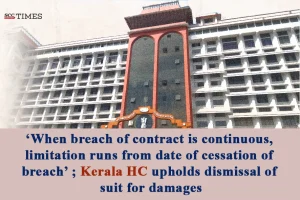Kerala High Court: In the present appeal, the plaintiff challenged the dismissal of the suit for damages for breach of contract by the Trial Court holding that the suit was barred by limitation. The Division Bench of Sathish Ninan* and P. Krishna Kumar, JJ., while dismissing the appeal, observed that in cases of breach of contract, the limitation period began running when the continuous breach ceased. The Court held that since the plaintiff failed to institute the suit within the prescribed period of three years from the date of such cessation, the suit was rightly dismissed by the Trial Court for being barred by limitation.
Background:
The plaintiff was a timber merchant who had entered into a contract with the defendants on 06-08-1998 to cut and remove trees standing in defendant’s property for a consideration of Rs 25 lakh. The defendants were to obtain passes from the Forest Department to enable the removal of the trees, and the labourers’ claim of the estate was also to be settled by the defendants. The plaintiff constructed a 25-kilometers motorable road through the property, constructed a stacking shed, arranged labourers etc. The period of the agreement was for one year from 01-09-1998.
The plaintiff stated that since the defendant failed to procure the necessary passes, the agreement was further extended till 03-04-2001. The plaintiff alleged that because of the defendants’ failure to obtain the passes, he was unable to remove the trees in their entirety, and thus, suffered damages. He then filed a suit for the realisation of the same.
However, the defendants argued that the contract had been performed in its entirety and that on such completion, on 01-10-2000, yet another agreement was entered between the parties for the removal of the trees in another property of the defendants. The plaintiff had suppressed that fact, and therefore, the defendant prayed for the dismissal of the suit.
The Trial Court found that the contract entered between the parties was duly performed and dismissed the suit. It was further held that the suit was barred by limitation.
Issues:
-
Is the plaint claim barred by limitation?
-
Has there been breach of contract by the defendants?
Analysis and Decision:
The Court noted that the period for performance had expired on 01-09-1999 after which, on 03-10-2000, the agreement was extended till 03-04-2001. The plaintiff had alleged breach on the part of the defendants and had filed the suit on 18-01-2005. The Court refuted the contention of the plaintiff’s counsel that the defendants had failed to obtain the passes from the Forest Department, resulting in a continuous breach, and hence, the suit could not be said to be time barred. The Court opined that Article 55 of the Limitation Act, 1963 (‘Limitation Act’), contemplated three situations:
-
when the contract is breached;
-
when there are successive breaches; and
-
when the breach is a continuing one.
The Court observed that when the breach was a continuing one, limitation began to run from the date on which the breach ceased. The Court explained Section 22 of the Limitation Act and stated that in cases of continuing breach, every moment the breach continued, a fresh period of limitation commenced. Article 55 of the Limitation Act provided that in the case of breach of contract, when the breach was continuous, limitation began to run from the date of cessation of the breach.
The Court opined that when the term of the agreement obliging the defendants to obtain passes from the Forest Department was breached by them, there occurred a breach of the contract. The breach continued only during the period of the contract and not upon its expiry. The Court observed that the breach was continuous, but only during the subsistence of the contract. Once the contractual period fixed by the parties had expired, the breach could no longer be considered ongoing. Accordingly, a suit for damages arising from the defendants’ breach could be maintained within three years from the date of expiry of the contract.
The Court observed that the defendants had contested the extension of the agreement up to 03-04-2001. Even assuming such an extension existed, it was limited to a specified period, and any breaches occurring during that period could be treated as continuous, allowing the plaintiff to wait until its expiry. However, once the period of the agreement expired, the limitation period commenced, and the plaintiff was required to file the suit within three years from that date.
Consequently, the Court held that since the plaintiff failed to institute the suit within the period of three years, the present suit was barred by limitation. The Court agreed with the Trial Court’s decision and dismissed the present appeal.
[V. Chandran v. Aliamma George, 2025 SCC OnLine Ker 11080, decided on 27-10-2025]
*Judgment authored by: Justice Sathish Ninan
Advocates who appeared in this case:
For the Plaintiff: M.R. Anandakuttan, Mahesh Anandakuttan, T. Saproo, M.A. Zohra, Advocates.
For the Respondents: M.C. Siny, R. Anas Muhammed Shamnad, Mohan Pulikkal, T.S. Rajasenan, R.Sudheer, Advocates.

